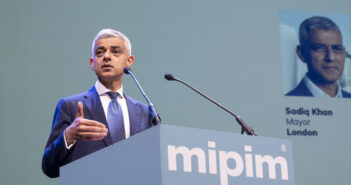In order for cities to standout, they need to showcase their local strengths in our increasingly competitive world. In the session, “Global Cities: the new powerhouses”, we heard from panellists working to reforge their cities identities while tackling outdated perceptions in hopes of becoming global powerhouses. In addition, JLL’s Rosemary Feenan provided some commentary and statistics on global cities and what to expect in the future.
Introduction of Panellists:
- Jules Pipe, Deputy Mayor for Planning, Regeneration and Skills Greater London Authority
- Suzanne Wylie, Chief Executive, Belfast City Council
- Mehmet Ceylan, Deputy Minister, Ministry of Environment and Urbanization- Turkey
- Rosemary Feenan, Director of Global Research Programmes, JLL
1866 was first time the illustrated London news used the “world city” to apply to the city of Liverpool. Today, there are almost 200 networks of cities around the world says JLL’s Director of Global Research Programmes, Rosemary Feenan. Cities have become untethered from their geography, and in today’s colorful, creative, competitive, cultural world of cities, we are still trying to understand what makes a global city.
Feenan shares a quote from Brookings Institute which claims that power is shifting downward from governments to cities and metropolitan areas. Its shifting horizontally from the public sector to this idea of the private city networks. In addition, its shifting across the world to capital and trade flows. These shifts can be seen as a realignment between nation, city, state and people providing a new landscape for cities compared to the traditional city-state era.
There are more than 300 publically available indices of city competiveness used by investors and corporations looking to relocate and invest capital. Cities today are vying to be recognized as competitive global cities and are looking for ways to integrate more connectivity, governance and partnerships. If they can find creative solutions to do so, cities have the opportunity to change their status and become more competitive.
As we look to the future, what might change the typical list of those cities that get the attention? Rather than focusing on GDP or the size, cities that position themselves for the future may come out on top and gain recognition. Barcelona, Oslo, Seattle and Austin which went from manufacturing to “millennial heaven”, are great examples of cities who have changed their status’ in a relatively short period of time and have become more competitive on a global basis. As these cities have evolved to become more competitive, it is good to look at how the top cities in the world continue to adapt to remain relevant in the world economy.
JLL is tracking London, NY, Paris, Hong Kong, Tokyo, Singapore and Seoul as the “Big 7” or the top cluster of cities. Amongst them, these cities take 25% of all direct real estate investment.
The fastest growing cluster of cities behind the Big 7 are known as the “Contender Cities” including San Francisco, Amsterdam, Toronto, Sydney, Madrid, Los Angeles, Chicago, Washington DC, Beijing and Shanghai. These cities account for 14% of direct real estate investment.
So how are cities positioning themselves to become the next powerhouse?
Panelist Suzanne Wylie, Chief Executive of Belfast City Council explains that Belfast was a world city in the 20th century that went through an industrial decline as well as a period of political and civil conflict. With more than 20 years of peace now, Belfast has rebranded itself and is trying to regain its status as a global city. The city has built innovation centers of excellence to support its strong tech sector in both cybersecurity and financial technology and has seen a large number of significant US companies investing and starting their businesses in Belfast. Tourism is also increasing at 10% per year and as a result 11 new hotels are being built at this time. Skills that they used to export are returning to the city and are filling open positions. Moving forward, the city will take a look at the whole ecosystem between Dublin, Belfast and London in terms of where businesses chose to locate their business and will continue to market themselves as a city who can offer a really strong skills base on more competitive costs of operation.
Another example of an emerging city in the global economy is Istanbul, Turkey. The panel was joined by Mehmet Ceylan, the Deputy Minister, Ministry of Environment and Urbanization. Ceylan described several ways Istanbul intends to stimulate political and economic strength. One method has been to invest in public infrastructure and mega attractions. Ceylan stated that Istanbul plans to install a new waterbay, with a 28 mile canal through the city; to be completed alongside 3 underwater tunnels for cars. This new port is expected to service 90 million people. As well, a $200 billion dollar suspension bridge was completed last year, to link across the Bosphorus Strait. City officials have also made movements to implement legislative arrangements that promote investment in Turkey.
One country that has recently been in the global spotlight is the United Kingdom. Jules Pipe, Deputy Mayor for Planning, Regeneration, and Skills, joined the panel to speak about London. Despite the fact that London is currently a part of “The Big Seven”, the city is not exempt from a range of obstacles. With Brexit continuously making headlines, London has faced publicity, immigration, and legislative issues. In addition, the residents of the United Kingdom, as a whole, share concerns over housing availability/affordability and pollution. In order to avoid substantial quality of life issues, the U.K. will need to provide around 66,000 homes per year for the foreseeable future. City officials in the metropolitan city have been challenged to navigate a new governmental and socio-economic landscape. One technique London has been implementing is providing the public consistent messaging. Pipe stated that the first step is “about having conversations”. Although the citizens of London “did not vote for Brexit”, their officials would like the world to know that London is “fundamentally strong” and “remains open for business”. The “uncertainty” that shrouds the country due to Brexit is what makes communities and investors the most uneasy. Officials would also like the public to know that “London is not complacent” and intends to reinvest in its infrastructure and citizens. A couple of industries that London is currently supporting are thin tech, clean tech, and med tech. Pipe stated that London hopes to remain open for global traffic and plans to build proper neighborhoods and “not create dormitories”.
Current global cities and potential future “powerhouses” will need to utilize a series of tools and methods to maintain relevance and remain competitive in the international marketplace. Creating a cohesive vision and implementing legislation to establish longevity are also key. The panellists from Belfast, Istanbul, and London showcased a city’s ability to reinvent, overcome, and strengthen global perceptions.
Written by Whitney Jorgensen and Taylor Stack



